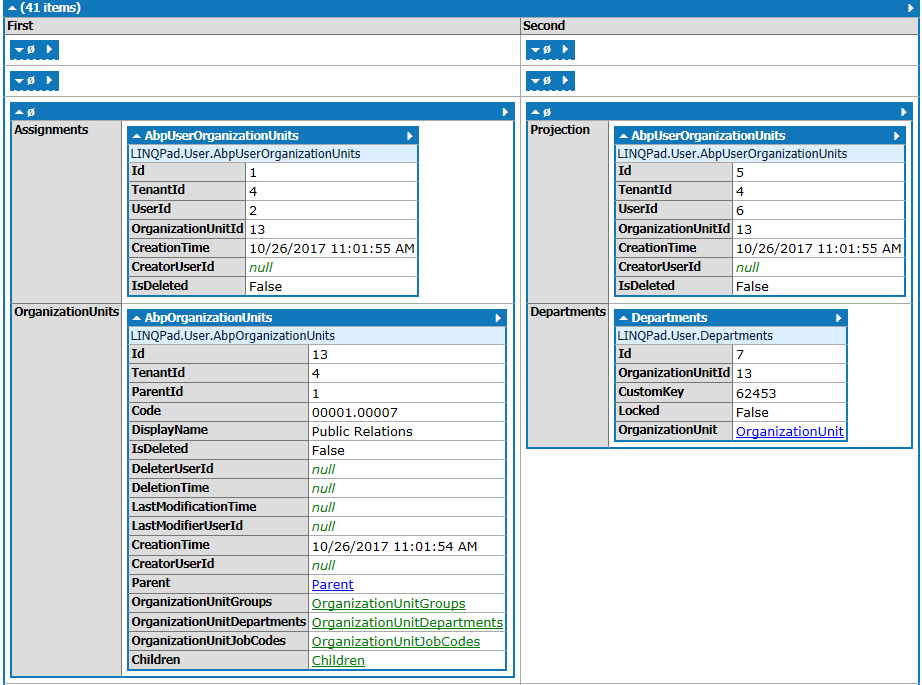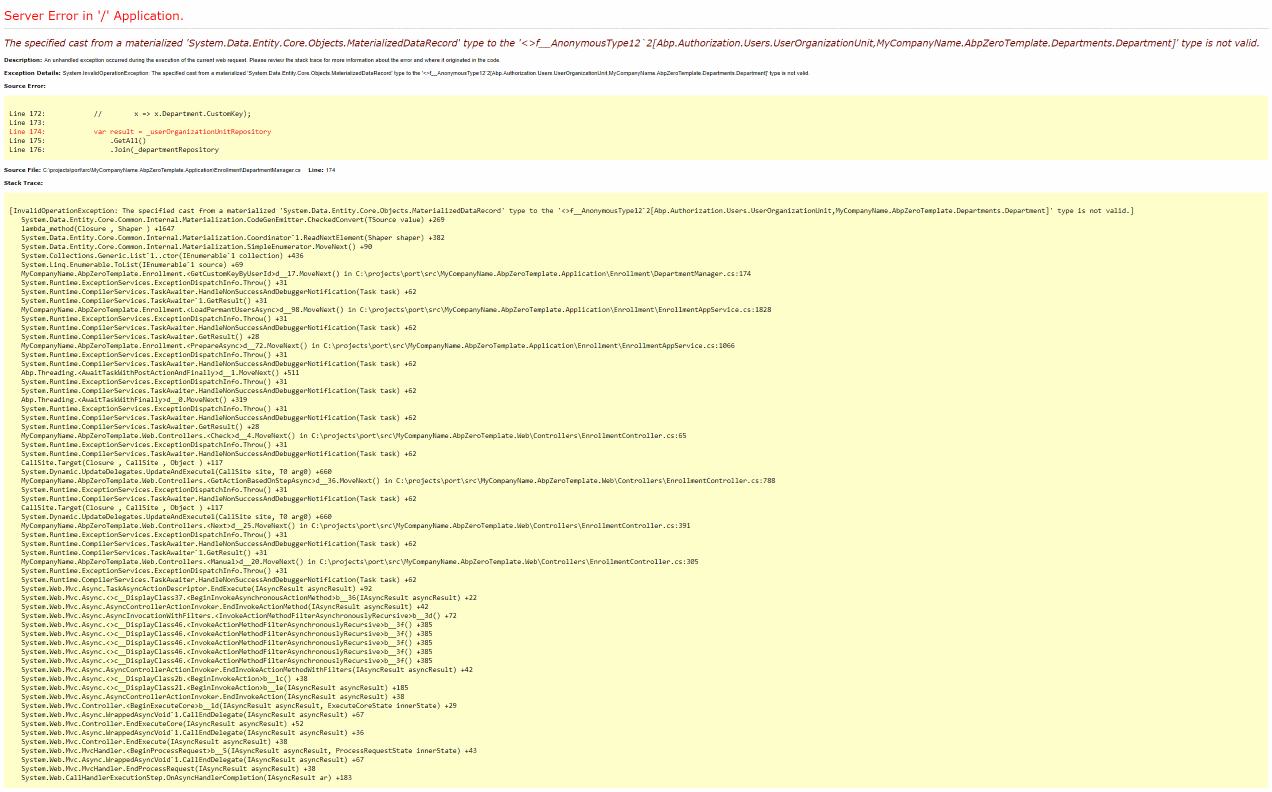Hello,
We are trying to join AbsUsersOrganizationUnits to a custom table called "departments" as below:
public class Department : Entity, IMustHaveOrganizationUnit
{
public const int MaximumIdLength = 50;
public const int MaximumTitleLength = 50;
public string CustomKey { get; set; }
public bool Locked { get; set; } = false;
public long OrganizationUnitId { get; set; }
public virtual OrganizationUnit OrganizationUnit { get; set; }
public Department()
{
}
public Department(long organizationUnitId, string cutomKey)
{
OrganizationUnitId = organizationUnitId;
CustomKey = cutomKey;
}
}
- Join the UserOrganizationUnits and OrganizationUnits as the variable "first."
- Join UserOrganizationUnit and our custom table of "departments" in the variable called "second".
- Join "first" and "second" as the variable called "third"
- Return expected result as a dictionary as the variable called "result" If any of these joins use .ToList (really hitting the database) then it throws :
The specified cast from a materialized 'System.Data.Entity.Core.Objects.MaterializedDataRecord' type to the '<>f__AnonymousType142[<>f__AnonymousType122[Abp.Authorization.Users.UserOrganizationUnit,Abp.Organizations.OrganizationUnit],<>f__AnonymousType13`2[Abp.Authorization.Users.UserOrganizationUnit,MyCompanyName.AbpZeroTemplate.Departments.Department]]' type is not valid.
The code that is failing is here:
public async Task<Dictionary<long, string>> GetFirstCustomKeysByUserIdAsync(IReadOnlyList<long> ids)
{
var assignments = _userOrganizationUnitRepository
.GetAll()
.Where(x => ids.Contains(x.UserId));
var organizationUnits = _organizationUnitRepository
.GetAll();
var departments = _departmentRepository
.GetAll();
var first = assignments
.Join(organizationUnits,
a => a.OrganizationUnitId,
ou => ou.Id,
(a, ou) => new { Assignments = a, OrganizationUnits = ou });
var second = assignments
.Join(departments,
a => a.OrganizationUnitId,
d => d.OrganizationUnitId,
(p, d) => new { Projection = p, Departments = d });
var third = first.Join(second,
f => f.Assignments.OrganizationUnitId,
s => s.Departments.OrganizationUnitId,
(f, s) => new { First = f, Second = s });
var result = await third.ToDictionaryAsync(x => x.First.Assignments.UserId,
x => x.Second.Departments.CustomKey);
return result;
}
Any suggestions would be appreciated. Thank you for your time and effort.
9 Answer(s)
-
0
Another point is that we can do this in Linqpad with the following code:
var ids = new List<long>{ 2, 3, 4, 5, 6, 7, 8 }; var assignments = AbpUserOrganizationUnits .Where(x => ids.Contains(x.UserId)).ToList(); var first = assignments.Join(AbpOrganizationUnits, a => a.OrganizationUnitId, ou => ou.Id, (a, ou) => new { Assignments = a, OrganizationUnits = ou }); var second = AbpUserOrganizationUnits .Join(Departments, a => a.OrganizationUnitId, d => d.OrganizationUnitId, (p, d) => new { Projection = p, Departments = d }); var third = first.Join(second, f => f.Assignments.OrganizationUnitId, s => s.Departments.OrganizationUnitId, (f, s) => new { First = f, Second = s }); third.Dump(); -
0
LinqPad (Works)
var results = AbpUserOrganizationUnits .Join(Departments, a => a.OrganizationUnitId, d => d.OrganizationUnitId, (p, d) => new { Projection = p, Departments = d }) .Where(x => ids.Contains(x.Projection.UserId)) .ToDictionary(x => x.Projection.UserId, x => x.Departments.CustomKey);C# (Errors)
var results = _userOrganizationUnitRepository .GetAll() .Join(_departmentRepository .GetAll(), a => a.OrganizationUnitId, d => d.OrganizationUnitId, (p, d) => new { Projection = p, Departments = d }) .Where(x => ids.Contains(x.Projection.UserId)) .ToDictionary(x => x.Projection.UserId, x => x.Departments.CustomKey);C# (Works)
var departments = _departmentRepository.GetAllList(); var assignments = _userOrganizationUnitRepository.GetAllList(); return departments.Join(assignments, d => d.OrganizationUnitId, a => a.OrganizationUnitId, (d, a) => new { Department = d, Assignment = a }) .ToDictionary(x => x.Assignment.UserId, x => x.Department.CustomKey); -
0
Hi,
Does this work ?
var results = _userOrganizationUnitRepository .GetAll() .Join(_departmentRepository .GetAll(), a => a.OrganizationUnitId, d => d.OrganizationUnitId, (p, d) => new { Projection = p, Departments = d }) .Where(x => ids.Contains(x.Projection.UserId)) .ToList() .ToDictionary(x => x.Projection.UserId, x => x.Departments.CustomKey); -
0
-
0
To defeat the file size limit we sent a message with an attachment to the info email address, which you provided in a prior forum suggestion.
This email contains a working example solution from Asp.Net Boilerplate that could illustrate the possible bug we have uncovered.
Thanks for your time.
Please let us know if you have follow-up questions.
-
0
Thanks @careLearning,
We have gor your email and we will investigate it in a short time.
-
0
Hi agian,
We are still investigating the problem of your linq method query syntax. In the mean time, you can use on of the below solutions.
//Solution 1 var query = (from ou in _userOrganizationUnitRepository.GetAll() join dep in _departmentRepository.GetAll() on ou.OrganizationUnitId equals dep.OrganizationUnitId into ouJoined from dep in ouJoined.DefaultIfEmpty() where ids.Contains(ou.UserId) select new { Projection = ou, Departments = dep }); return query.ToDictionary(x => x.Projection.UserId, x => x.Departments.CustomKey);//Solution 2 //First define a class like this public class MyTemProj { public UserOrganizationUnit Projection { get; set; } public Department Departments { get; set; } } //Then use it in your query return _userOrganizationUnitRepository .GetAll() .Join(_departmentRepository .GetAll(), a => a.OrganizationUnitId, d => d.OrganizationUnitId, (p, d) => new MyTemProj { Projection = p, Departments = d }) .Where(x => ids.Contains(x.Projection.UserId)) .ToDictionary(x => x.Projection.UserId, x => x.Departments.CustomKey); -
0
Hello,
Were you able to find out any more information about this issue? Thanks!
-
0
Hi @careLearning,
Unfortunately, we haven't looked at it yet. Did any of my last suggestions work for you ?





